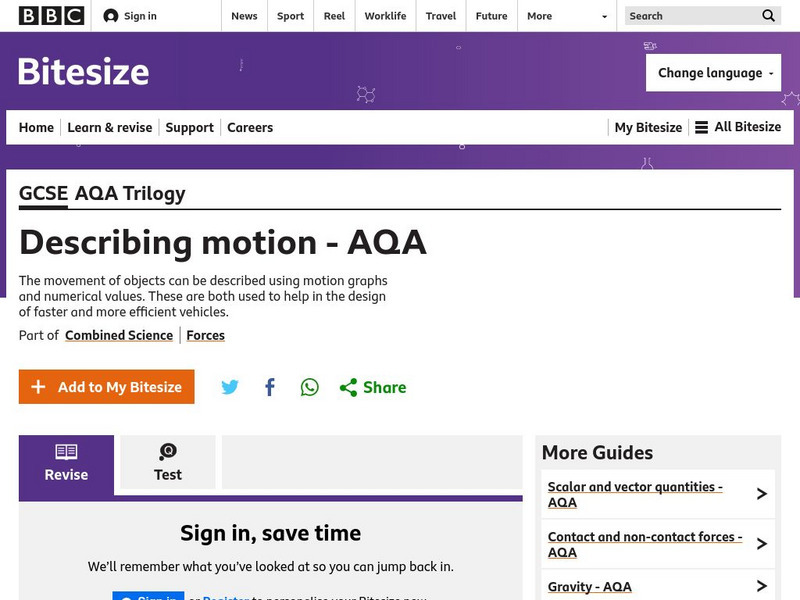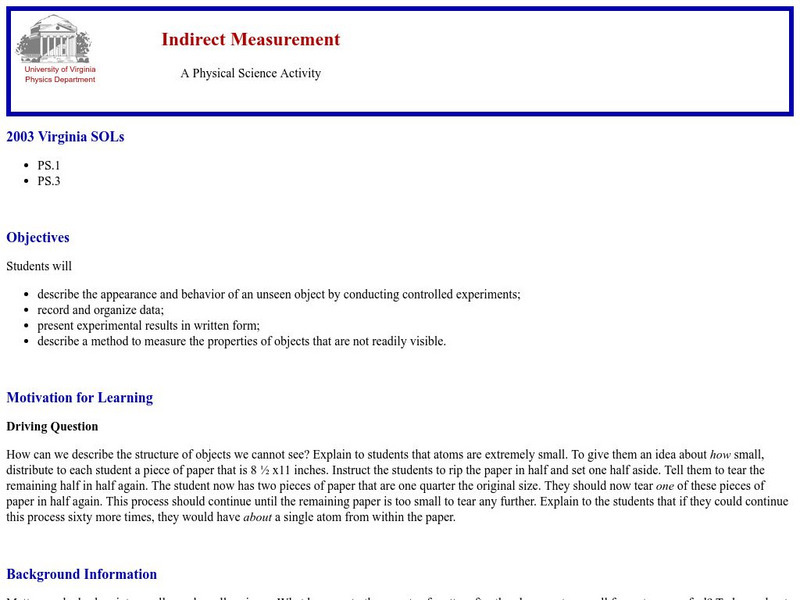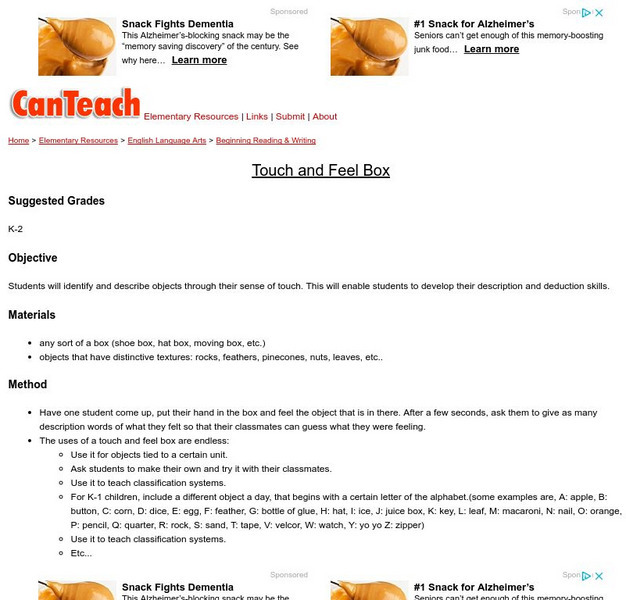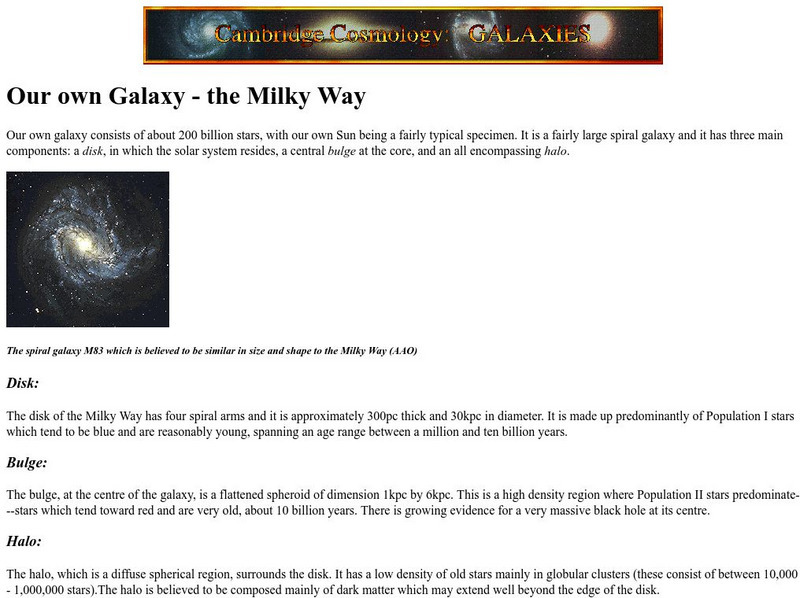E-learning for Kids
E Learning for Kids: Science: Bikini Atoll: Senses: Observation of Familiar Materials and Objects
Students use their senses to identify and describe objects.
Google
Google for Education: Describing an Everyday Object
In this activity, young scholars act like inventors of an object that does not yet exist, and they try to describe what need would be fulfilled by this object, and how specifically it functions.
CK-12 Foundation
Ck 12: Charging Objects
[Free Registration/Login may be required to access all resource tools.] The laws that govern interactions between charged particles are explained, and methods of creating a net charge on an object are described.
Science Education Resource Center at Carleton College
Serc: Describing Fall Leaves Through Words and Music
Students collect, describe, and sort leaves found outside. As a cross-curricular component, they will improvise on musical instruments in a way that they feel describes a dominant leaf characteristic.
Physics Classroom
The Physics Classroom: 1 D Kinematics: Describing Motion Distance & Displa [Pdf]
A collection of high-school level physics problems with an emphasis on kinematics where learners practice describing an object's motion.
BBC
Bbc: Gcse Bitesize: Describing Motion Aqa
This lesson focuses on Distance-time graphs; the gradient of a distance-time graph represents the speed of an object.
CK-12 Foundation
Ck 12: Elem Math: Classifying Real Life Objects as Basic 2 D Shapes
[Free Registration/Login may be required to access all resource tools.] The video describes how to classify a real-world object as a circle, triangle, square or rectangle. The video is followed by additional practice problems.
TeachEngineering
Teach Engineering: Don't Confuse Your Qs!
Students investigate the difference between qualitative and quantitative measurements and observations. By describing objects both qualitatively and quantitatively, they learn that both types of information are required for complete...
University of Virginia
University of Virginia: Indirect Measurement
This site contains an exercise that teaches about indirect measurements, used in this case to describe objects we cannot see.
NASA
Nasa: What Is a Planet?
This lesson teaches students about the characteristics of planets, comets, asteroids, and trans-Neptunian objects. After learning about these different things, students then are to debate about a new object that is found in space.
Other
Calvin College: Inheritance and Oop
A presentation in PowerPoint format that describes the object oriented programming concept of inheritance. Examples use the Java programming language.
PBS
Pbs Learning Media: Move That Math: Lesson Plan
Combine addition of numbers identified from playing cards with physical activity to engage students and increase overall fitness. This lesson plan describes a twenty to twenty five minute series of activities that require two decks of...
The Franklin Institute
The Franklin Institute: Classified
At this site from The Franklin Institute you can practice classifying objects according to physical structure and characteristics.
K-5 Math Teaching Resources
K 5 Math Teaching Resources: Is It Longer?
A classroom activity provides practice comparing the measurable attributes of objects.
Physics Classroom
The Physics Classroom: Circular, Satellite, Rotational: Uniform Circular Motion
Uniform circular motion can be described as the motion of an object in a circle at a constant speed. This animation depicts this by means of a vector arrow.
Khan Academy
Khan Academy: Beaver Character
Use object-oriented design, discussed in this tutorial, to describe a hopping Beaver character.
Physics Classroom
The Physics Classroom: 1 D Kinematics: Acceleration [Pdf]
Use this printable physics learning exercise which allows students to practice problems describing motion using acceleration.
Education.com
Education.com: k.g.a.1 Worksheets
[Free Registration/Login Required] These worksheets help students practice describing objects in the environment using names of shapes and describing the relative positions of these objects using terms such as above, below, beside, in...
ClassFlow
Class Flow: Adjectives, People, Places & Things
[Free Registration/Login Required] In this Flipchart, students are introduced to adjectives as a part of speech. Teachers can use this flipchart to help students make connections between pictures of familiar objects and words which...
University of Oxford (UK)
Oxford University Museum of Modern History: Mineral Mix and Match
A simple activity where you must choose the properties that describe both the mineral and an object made from it. The activity can be played with new sets of minerals, objects, and properties.
PBS
Pbs Mathline Lesson: Geometry, It's a Perfect Fit [Pdf]
This two-part geometry lesson plan has learners identify, describe, and classify two-dimensional shapes. Students engage in hands-on activities including identifying shapes in the classroom, creating patterns with shapes, identifying...
Sophia Learning
Sophia: Asteroids, Comets and Meteors
A brief vocabulary overview describing the difference between asteroids, comets, and meteors.
Can Teach
Can Teach: Touch and Feel Box
Students will identify objects through their sense of touch and increase vocabulary skills by using describing words. Lesson plan for K-2nd grades.
University of Cambridge
University of Cambridge: Cosmology: Galaxies
This site from the Cambridge Relativity provides a brief description of the structure of the Milky Way galaxy. The parts described are the disc, bulge, and halo.

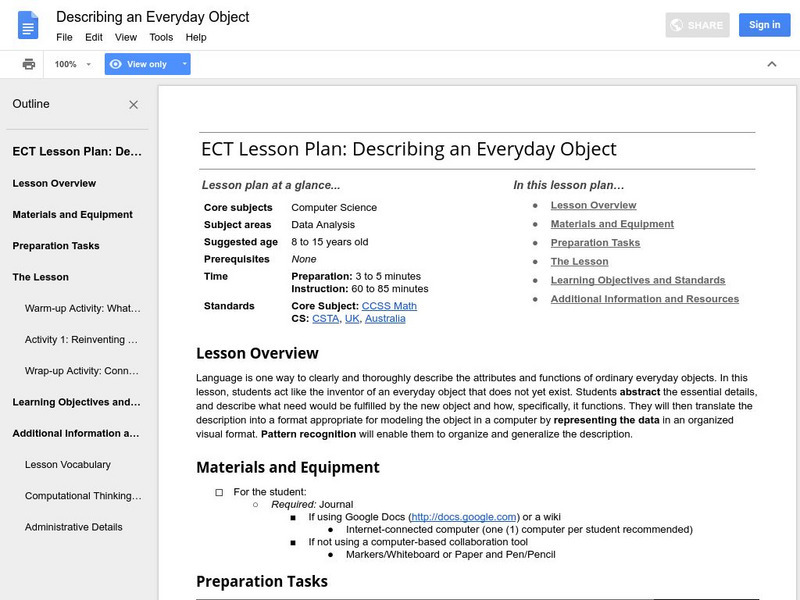

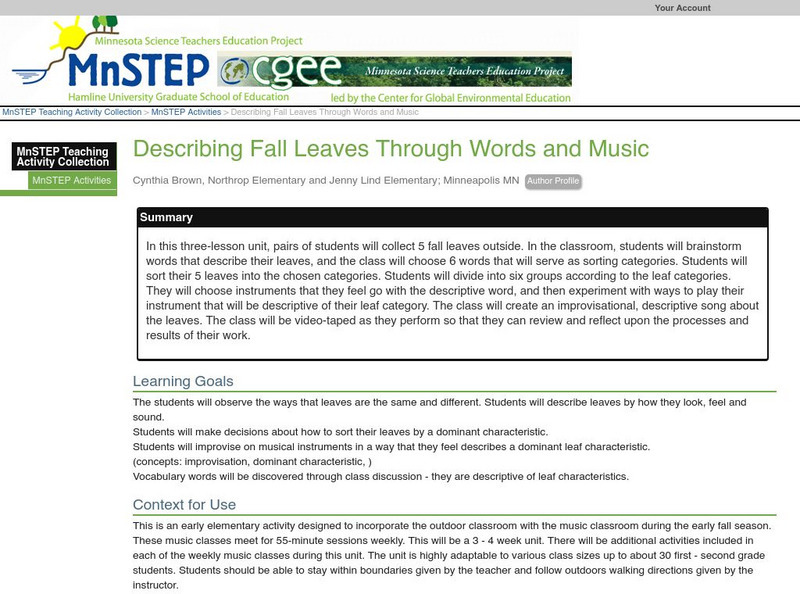
![The Physics Classroom: 1 D Kinematics: Describing Motion Distance & Displa [Pdf] Unknown Type The Physics Classroom: 1 D Kinematics: Describing Motion Distance & Displa [Pdf] Unknown Type](https://d15y2dacu3jp90.cloudfront.net/images/attachment_defaults/resource/large/FPO-knovation.png)
